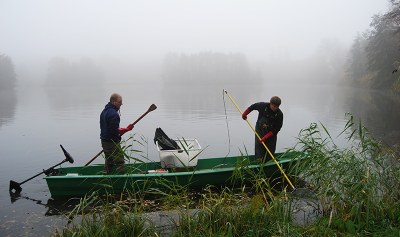Co-production of environmental knowledge by fisheries scientists and practitioners pays large educational dividends for sustainability

Fishing in Helmstedt Foto: Robert Arlinghaus and Besatzfisch
Projekt/IGB
Nature is complex and difficult to understand. Even the leading researchers in the field of natural resource management find it impossible to predict exactly how natural ecosystems will develop in response to management measures that dynamically interact with natural factors. Therefore, understanding the full impact of human activities necessitates field experiments lasting several years, to adapt management to the development of new knowledge. This is called active adaptive environmental management. And yet academic knowledge is of little use if it is not combined with applied knowledge on the ground, collaboratively refined, and ultimately put to practical use. Remaining in the ivory tower is not how to achieve greater sustainability.
Transdisciplinary sustainability research integrates applied science with a commitment to society, seeking to resolve critical sustainability issues with close cooperation between researchers and practitioners. One benefit that collaborative research by scientists and citizen scientists promises to deliver is hands-on learning of research results relevant to everyday life. Until now, however, there was no quantitative evidence that this form of participatory research pays educational dividends for sustainability.
Environmental educational experiment
In cooperation with biology educationalists from Tübingen University and numerous angling clubs from Lower Saxony (Germany) in the role of practitioners, fisheries scientists from the Berlin Leibniz-Institute of Freshwater Ecology and Inland Fisheries (IGB) and the Humboldt-Universität zu Berlin (HU) have conducted an extensive, social-ecological fisheries experiment over the period of several years. The experiment involved investigating whether stocked fish become established in their new environment, and to what extent relative to naturally reproducing stock components. Despite being a traditional management practice in fisheries, there are concerns that fish stocking has no sustained effect in many cases, and may even cause environmental damage, such as an outbreak of disease or the loss of locally adapted populations through hybridization of stocked and wild fishes. Many anglers and fisheries managers, on the other hand, believe that there is no alternative to fish stocking, if we want to preserve and increase fish stocks in human-impacted freshwaters. The resulting uncertainty can only be reduced by conducting large-scale experiments on managed lakes and rivers. The long-term ecological fish stocking experiment was combined with an environmental educational experiment on the learning success generated by collaborative research.
Collaborative research produces two-way knowledge transfer
In the fish stocking project (www.besatz-fisch.de) financed by the German Federal Ministry of Education and Research within the programme on Social-ecological research, fisheries scientists headed by the lead investigator Professor Robert Arlinghaus monitored the success of stocking 24 lakes, managed by anglers, with marked carp and pike over a period of five years. The experiment was accompanied by a small group of social scientists, who collaborated with anglers and fisheries resource managers to plan and evaluate ecological fish stocking experiments in the context of workshops. The measurement of environmental educational success was based on three experimental groups: a placebo group, a group of anglers and fisheries managers trained in science-based knowledge of fish stocking in a lecture format, and a group that was directly involved in the field experiments after having also attended the 4.5-hour seminar on the theory of fish stocking. Training programmes for fisheries officers usually only include theoretical training.
Although theoretical training also changed the environmental knowledge of anglers and fisheries managers in the long term compared to the placebo group, the greatest environmental educational impact was made on the participatory group. Not only was this group able to remember more facts ten months after the programme had ended, there were also changes in their personal standards and basic environmental convictions. One particular change was their greater acceptance of alternative management approaches involving fewer environmental risks, such as habitat enhancement or harvest regulations, rather than continuing to manage fisheries via fish stocking. This is the first quantitative evidence that intensive cooperation among scientists and practitioners pays off and leaves an educational legacy beyond the realm of science.
“Our study shows that active participation in nature experiments achieves greater educational success than passive listening,” explained Tübingen University’s Professor Christoph Randler. “Collaborative research on equal terms produces two-way knowledge transfer that both enhances applied science and has impacts extending beyond the sphere of science,” added lead author Dr. Marie Fujitani. “It is essential to foster the interfaces between environmental practice and research, so that transdisciplinary research based on well-evaluated field experiments can be used on a large scale,” concluded Professor Robert Arlinghaus. The results can likely be transferred to other situations where humans use and shape nature, such as in agriculture or forestry.
More Information
Source: Fujitani, M., McFall, A., Randler, C., Arlinghaus, R. (im Druck). Participatory adaptive management leads to environmental learning outcomes extending beyond the sphere of science. Science Advances.
Contact
Prof. Dr. Robert Arlinghaus
Humboldt-Universität zu Berlin und Leibniz-Institut für Gewässerökologie und Binnenfischerei arlinghaus@igb-berlin.de
Dr. Marie Fujitani
Leibniz-Institute of Freshwater Ecology and Inland Fisheries and Leibniz Centre for Tropical Marine Research
fujitani@igb-berlin.de
Media Contact
Humboldt-Universität zu Berlin
Stabsstelle Presse und Öffentlichkeitsarbeit
Tel.: 030 2093-2345
pr@hu-berlin.de
